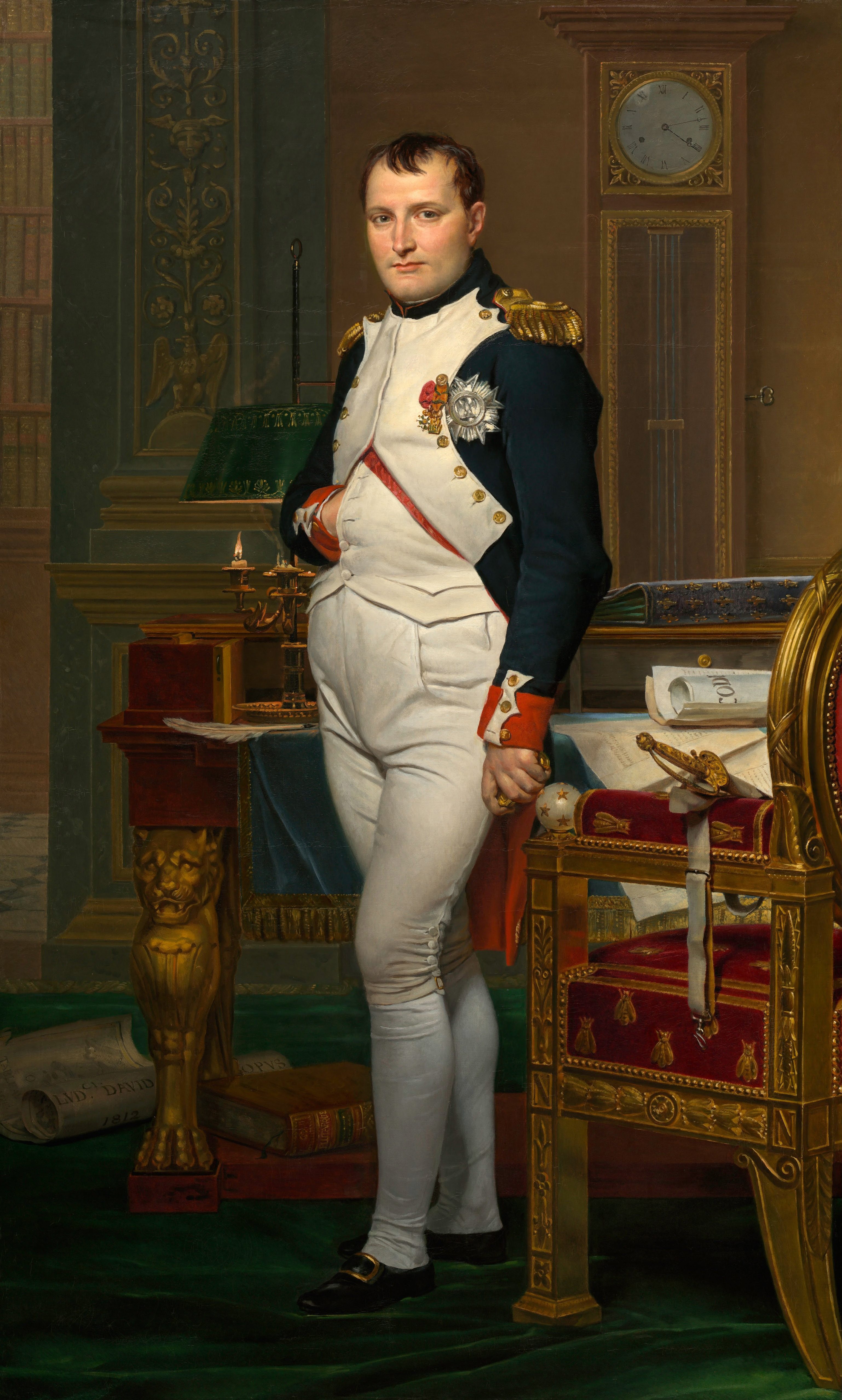Napoleon I of France Quotes
“Never march by flank in front of an army in position. This principle is absolute.”
Napoleon : In His Own Words (1916)
“The fool has one great advantage over a man of sense — he is always satisfied with himself.”
Napoleon : In His Own Words (1916)
Napoleon : In His Own Words (1916)
“We frustrate many designs against us by pretending not to see them.”
Napoleon : In His Own Words (1916)
“Ordinarily men exercise their memory much more than their judgment.”
Napoleon : In His Own Words (1916)
“The life of a citizen is the property of his country.”
Political Aphorisms, Moral and Philosophical Thoughts (1848)
Napoleon : In His Own Words (1916)
“Our hour is marked, and no one can claim a moment of life beyond what fate has predestined.”
To Dr. Arnott (April 1821)
“Wherever wood can swim, there I am sure to find this flag of England.”
Statement at Rochefort (July 1815)
Italian saying, quoted by Bonaparte during the first Italian campaign to highlight the financial dependence of the Directoire on the plunder from the Army of Italy, according to Lucian S. Regenbogen, Napoléon a dit : aphorismes, citations et opinions, p. 82.
Attributed
Source: Political Aphorisms, Moral and Philosophical Thoughts (1848), p. 246
“The completest charlatan that ever existed.”
Thomas Paine, as quoted in Thomas Paine https://en.wikipedia.org/wiki/Special:BookSources/0-670-03788-5, by Craig Nelson, p. 299.
About
“Unite for the public safety, if you would remain an independent nation.”
Proclamation to the French People (22 June 1815)
Campagnes d'Egypte et Syrie, Paris, Imprimerie Nationale, 1998, p. 275. Translated by John Tolan http://en.wikipedia.org/wiki/John_Tolan in European Accounts of Muhammad's Life http://www.academia.edu/1834648/European_Accounts_of_Muhammads_Life. Napoleon wrote his memoirs on the island of Saint Helena. It is here he develops his portrait of Muhammad as a model lawmaker and conqueror.
“Success is the most convincing talker in the world.”
Napoleon : In His Own Words (1916)
“There is only one favorable moment in war; talent consists in knowing how to seize it.”
Napoleon : In His Own Words (1916)
Napoleon : In His Own Words (1916)
“Sometimes a great example is necessary to all the public functionaries of the state.”
Source: Political Aphorisms, Moral and Philosophical Thoughts (1848), p. 248
In a statement about Jesus Christ. While exiled on the rock of St. Helena, Napoleon called Count Montholon to his side and asked him, "Can you tell me who Jesus Christ was?" Upon the Count declining to respond Napoleon countered. Ravi Zacharias, Jesus Among Other Gods http://books.google.com/books?id=jSI9HnMHdPsC&pg=PA149&lpg=PA149&dq=napoleon+jesus+among+gods&source=bl&ots=CdsDSjamnm&sig=K3l7Ek972r7pyEFT681lbf3PVSQ&hl=en&sa=X&ei=nBqhUf3RL4au9AS37ICwCQ&ved=0CBYQ6AEwAA, p. 149, in Henry Parry Liddon (1868) The Divinity of Our Lord and Saviour Jesus Christ; Eight Lectures. New edition. https://books.google.com/books?id=IcINAAAAYAAJ&pg=PA148&dq#v=onepage&q&f=false pp. 147-148, and in Henry Parry Liddon (1869) The Divinity of Our Lord and Saviour Jesus Christ; Eight Lectures. Fourth edition. https://ia800203.us.archive.org/15/items/divinityofourlord00libbrich/divinityofourlord00libbrich.pdf pp. 147-148.
Attributed
Said after Dupont's capitulation at w:Bailén to the Spanish (1808), as quoted in The Art of Warfare on Land (1974) by David G. Chandler, p. 164
“Jesus Christ was the greatest republican.”
Napoleon : In His Own Words (1916)
Napoleon : In His Own Words (1916)
Statement on his relations with the Empress Josephine (19 May 1816), quoted in The Story of Civilization (1935) by Will Durant and Ariel Durant, p. 234
“Ordinary men died, men of iron were taken prisoner: I only brought back with me men of bronze.”
Statement of 1812, quoted in Napoleon's Cavalry and its Leaders (1978) by David Johnson
Les hommes ordinaires ont succombé, disait-il; les hommes de fer ont été faits prisonniers; je ne ramène avec moi que les hommes de bronze.
Mémoires du colonel Combe sur les campagnes de Russie 1812, de Saxe 1813, de France 1814 et 1815. Paris 1853. p. 184 books.google https://books.google.de/books?id=KhlYAAAAcAAJ&pg=PA184
“In order not to be astonished at obtaining victories, one ought not to think only of defeats.”
Napoleon : In His Own Words (1916)
Tighe Hopkins in The Women Napoleon Loved
About
“My most splendid campaign was that of March 20; not a single shot was fired.”
Napoleon : In His Own Words (1916)
Napoleon : In His Own Words (1916)
“Malice delights to blacken the characters of prominent men.”
Memoirs of Napoleon (1829-1831)
“There is nothing so imperious as feebleness which feels itself supported by force.”
Napoleon : In His Own Words (1916)
“A Government protected by foreigners will never be accepted by a free people.”
Political Aphorisms, Moral and Philosophical Thoughts (1848)
Depuis le premier jour jusqu'au dernier, il est le même, toujours le même, majestueux et simple , infiniment sévère et infiniment doux ; dans un commerce de vie pour ainsi dire public, Jésus ne donne jamais de prise à la moindre critique; sa conduite si prudente ravit l'admiration par un mélange de force et de douceur.
Statement (1803) as quoted in The Mind of Napoleon (1955) by J. Christopher Herold
“Unhappy the general who comes on the field of battle with a system.”
Napoleon : In His Own Words (1916)
Napoleon : In His Own Words (1916)
Napoleon : In His Own Words (1916)
